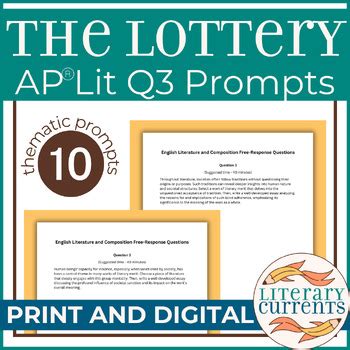Introduction: A Journey into Literary Depths
The College Board’s AP Literature and Composition exam presents candidates with multiple-choice questions (MCQs) and a free-response question (FRQ). The Q3 FRQ prompts delve into the intricate complexities of literary works, testing students’ understanding of literary devices, themes, and authorial intent. By strategically preparing for Q3, students can unlock the key to literary analysis success.

Comprehend the Prompt: A Critical Foundation
The first step towards successful Q3 performance lies in comprehending the prompt’s requirements. Candidates must carefully read the prompt to identify the literary work being examined, the specific elements to analyze, and the perspective to adopt. Close attention to instructions will help students avoid common pitfalls of ignoring prompt requirements.
Analyze Literary Devices: Unraveling the Techniques
Literary devices are the tools used by writers to convey their messages and engage readers. In Q3, candidates are expected to analyze literary devices such as imagery, symbolism, foreshadowing, and tone. By recognizing and interpreting these techniques, students can unlock the depth and nuance of literary works.
Explore Themes: Uncovering the Heart of the Work
Themes are the central ideas or messages that writers convey through their works. Identifying themes requires students to synthesize information and draw connections between different aspects of the text. By extracting and analyzing themes, students gain a profound understanding of the author’s purpose and the work’s significance.
Interpret Authorial Intent: Comprehending the Writer’s Perspective
Another crucial element of Q3 analysis involves interpreting authorial intent. Candidates must consider the author’s choices, such as character development, plot structure, and language, to infer the author’s purpose, attitude, and message. By understanding the authorial intent, students can offer well-supported interpretations of the work.
Craft Effective Responses: A Blueprint for Success
Effective Q3 responses exhibit clear organization, logical flow, and precise language. Begin by introducing the prompt’s requirements and the literary work being analyzed. Support your analysis with evidence from the text, including direct quotations, paraphrases, and summaries. Develop a cohesive argument that connects the literary devices, themes, and authorial intent to create a comprehensive interpretation. Ensure that your writing is free of grammatical errors and adheres to proper formatting guidelines.
Tips and Tricks: Enhancing Your Performance
-
Annotate the Text: Take notes while reading the literary work to highlight key literary devices and themes.
-
Develop a Thesis Statement: Before writing, formulate a concise thesis statement that encapsulates your interpretation of the prompt.
-
Provide Sufficient Evidence: Back up your analysis with ample evidence from the text.
-
Avoid Overgeneralizations: Focus on specific elements of the work rather than making broad generalizations.
-
Proofread Carefully: Review your response for clarity, accuracy, and adherence to the prompt’s requirements.
Common Mistakes to Avoid: Pitfalls to Steer Clear of
-
Ignoring Prompt Requirements: Pay heed to the specific instructions provided in the prompt.
-
Failing to Analyze Literary Devices: Omit no mention of crucial literary devices that contribute to the work’s impact.
-
Misinterpreting Themes: Ensure that your identified themes are supported by evidence and are not personal preferences.
-
Overlooking Authorial Intent: Consider the author’s perspective and its influence on the work’s meaning.
-
Lacking Organization: Structure your response logically to guide readers through your analysis.
How to Approach Q3: A Step-by-Step Guide
-
Read the Prompt Carefully: Understand the work, elements, and perspective being examined.
-
Annotate the Text: Mark the literary devices and themes.
-
Develop a Thesis Statement: Craft a concise statement reflecting your interpretation.
-
Identify Literary Devices: Analyze how they contribute to the work’s meaning.
-
Explore Themes: Uncover the central ideas and their significance.
-
Interpret Authorial Intent: Infer the author’s purpose and attitude.
-
Craft an Essay Outline: Organize your analysis and evidence.
-
Write Your Response: Develop your thesis, provide evidence, and demonstrate your comprehension.
-
Proofread Carefully: Review your work for accuracy, clarity, and adherence to the prompt.
Applications: The Real-World Value of Q3 Skills
The skills honed in Q3 analysis extend far beyond the AP Literature exam. They are invaluable in various fields:
-
Critical Thinking and Analysis: Enhanced ability to dissect complex ideas and make logical deductions.
-
Communication and Expression: Improved ability to convey ideas clearly, persuasively, and systematically.
-
Critical Reading: Sharpened skills in interpreting and comprehending written works.
-
Research and Academics: Enhanced research capabilities and ability to synthesize information from multiple sources.
Tables: Key Information for Q3 Success
| Literary Device | Definition | Impact on Work |
|---|---|---|
| Imagery | Language that appeals to the senses | Creates vivid impressions, enhances atmosphere |
| Symbolism | Use of symbols to represent ideas or concepts | Adds depth and complexity, reveals hidden meanings |
| Foreshadowing | Hints or clues that suggest future events | Builds suspense, creates anticipation |
| Tone | Author’s attitude towards the subject | Conveys mood, influences reader’s perception |
| Theme | Central Idea or Message of the Work | Provides insight into human experience, explores universal truths |
| Authorial Intent | Purpose, Attitude, and Message of the Author | Reveals writer’s perspective, guides interpretation |
| Analysis | Process of Interpreting and Evaluating a Work | Uncovers literary devices, themes, and authorial intent |
| Tip | Benefit |
|---|---|
| Annotate the Text | Improved comprehension, identification of key elements |
| Develop a Thesis Statement | Clear direction for analysis, focused response |
| Provide Sufficient Evidence | Supports analysis, adds credibility |
| Avoid Overgeneralizations | Ensures precision and accuracy |
| Proofread Carefully | Eliminates errors, enhances readability |
Conclusion: The Path to Q3 Mastery
Q3 prompts in AP Literature and Composition present students with a challenging yet rewarding opportunity to engage with literary works on a profound level. By comprehending the prompt, analyzing literary devices, exploring themes, interpreting authorial intent, and crafting effective responses, candidates can unlock the secrets of literary analysis and achieve success in Q3.
